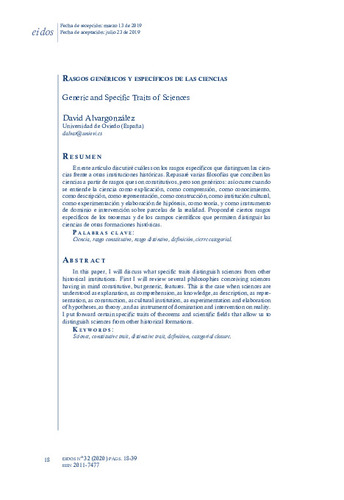Rasgos genéricos y específicos de las ciencias
Otros títulos:
Generic and Specific Traits of Sciences
Autor(es) y otros:
Palabra(s) clave:
Ciencia
Cierre categorial
Definición
Rasgo constitutivo
Science
Categorial closure
Definition
Distinctive trait
Fecha de publicación:
Editorial:
Universidad del Norte
Citación:
Descripción física:
Resumen:
En este artículo discutiré cuáles son los rasgos específicos que distinguen las ciencias frente a otras instituciones históricas. Repasaré varias filosofías que conciben las ciencias a partir de rasgos que son constitutivos, pero son genéricos: así ocurre cuando se entiende la ciencia como explicación, como comprensión, como conocimiento, como descripción, como representación, como construcción, como institución cultural, como experimentación y elaboración de hipótesis, como teoría, y como instrumento de dominio e intervención sobre parcelas de la realidad. Propondré ciertos rasgos específicos de los teoremas y de los campos científicos que permiten distinguir las ciencias de otras formaciones históricas.
En este artículo discutiré cuáles son los rasgos específicos que distinguen las ciencias frente a otras instituciones históricas. Repasaré varias filosofías que conciben las ciencias a partir de rasgos que son constitutivos, pero son genéricos: así ocurre cuando se entiende la ciencia como explicación, como comprensión, como conocimiento, como descripción, como representación, como construcción, como institución cultural, como experimentación y elaboración de hipótesis, como teoría, y como instrumento de dominio e intervención sobre parcelas de la realidad. Propondré ciertos rasgos específicos de los teoremas y de los campos científicos que permiten distinguir las ciencias de otras formaciones históricas.
In this paper, I will discuss what specific traits distinguish sciences from other historical institutions. First I will review several philosophies conceiving sciences having in mind constitutive, but generic, features. This is the case when sciences are understood as explanation, as comprehension, as knowledge, as description, as representation, as construction, as cultural institution, as experimentation and elaboration of hypotheses, as theory, and as instrument of domination and intervention on reality. I put forward certain specific traits of theorems and scientific fields that allow us to distinguish sciences from other historical formations
In this paper, I will discuss what specific traits distinguish sciences from other historical institutions. First I will review several philosophies conceiving sciences having in mind constitutive, but generic, features. This is the case when sciences are understood as explanation, as comprehension, as knowledge, as description, as representation, as construction, as cultural institution, as experimentation and elaboration of hypotheses, as theory, and as instrument of domination and intervention on reality. I put forward certain specific traits of theorems and scientific fields that allow us to distinguish sciences from other historical formations
ISSN:
Ficheros en el ítem





